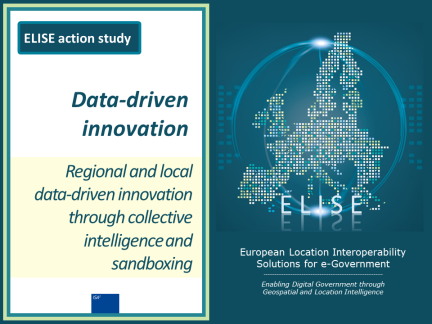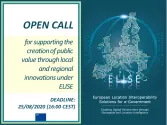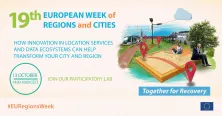
Background and scope
The study Regional and local data-driven innovation through collective intelligence and sandboxing was launched by the Digital Economy Unit of the Directorate Growth and Innovation of the JRC Ispra in the framework of the ELISE Action of the ISA2 Programme, with the aim to explore the interplay between digital technology and other factors transforming government operations in terms of service delivery, governance processes and policy-making mechanisms.
The objective is to assess the impact of the adoption of regional and local data ecosystems and digital twins, by exploring several governance and business models by taking advantage of a sandboxing approach. Here, sandboxing refers to testing solutions in a safe environment, with a focus on institutional and technical innovations to enable more efficient and effective delivery of public services through data sharing and reuse.

- Mapping the data ecosystems of various European cities, understanding their strengths and weaknesses
- Identifying technologies, approaches, models of different uses of data through sandboxes, namely agile and inclusive testing environments.
- Summarising and disseminating lessons learned to ensure the sustainability of the identified beneficial uses of data.
- Validating results, developing policy recommendations and suggesting research topics to spread and scale the creation of value from data
Outcomes of the research
- Description and analysis of regional and/or city data ecosystems. Seven local data ecosystems have been analysed – Barcelona (ES), Bordeaux Metropole (FR), Helsinki (FI), Milan (IT), Santander (ES), Poznan (PL) and Rome (IT) – assessing their data governance models, including for instance, the high-level architectures, the data flows, the services provided, the stakeholders involved, the level of maturity, etc.
- Overview of the established sandboxes together with a description of their use. Based on the main challenges identified by city authorities for their data ecosystems, four cities, Barcelona (ES), Helsinki (FI), Milan (IT) and Poznan (PL) have co-designed and implemented sandboxing experiments with the project team in order to address the areas for improvements and test innovative solutions.
The following sandboxing experiments were conducted:
- Poznan - Developing a Proof of Concept for B2G Data Sharing in Micro-mobility
- Milan - Bringing New Parties into Data Ecosystems
- Barcelona - Improving and Automating Data Management
- Helsinki - Learning from Alternative Sandboxing Approaches
| The lessons learned from the study are published in the Playbook "Sandboxing. How to use it to strengthen your local data ecosystem" which is available here. |
The project was presented in the following public events*
2021 European Week of Regions and Cities
The preliminary results of the study were presented and discussed in a Participatory Lab during the European Week of Regions and Cities. Participants discussed the results of the data ecosystems analysis in seven different European cities: Barcelona (ES), Bordeaux Metropole (FR), Helsinki (FI), Milan (IT), Santander (ES), Poznan (PL) and Rome (IT), by sharing best practicies and challenges identified in the different local contexts.
Workshop on sandboxing results - Thursday, 28 April 2022 (14:00 - 16:00 CEST)
This event presented the activities and results achieved in four cities by applying the sandboxing approach to test innovative solutions in local data ecosystems.
Final Policy Lab - Friday, 20 May 2022 (10:00 - 12:00 CEST)
How can experimenting using a "sandboxing" approach help contribute to the development of local data ecosystems, and address key urban challenges related to mobility, energy, and housing?
During this Policy Lab, we presented the key findings and recommendations of the project. The session focused on key results and best practices for how cities can adopt and leverage a sandboxing approach to develop their data ecosystems, with view to the proposed EIF4SCC and upcoming Data Act.
The Policy Lab involved around 40 participants, including representatives of cities involved in the project (Barcelona, Bordeaux Metropole, Helsinki, Milan, Poznan, Rome, Santander) as well relevan experts from other European cities: (Amsterdam Metropolitan Area, Athens, Aarhus, Bristol, Eindhoven, London, Porto, Rotterdam, Sofia, Valencia).
---
*all events were held online



